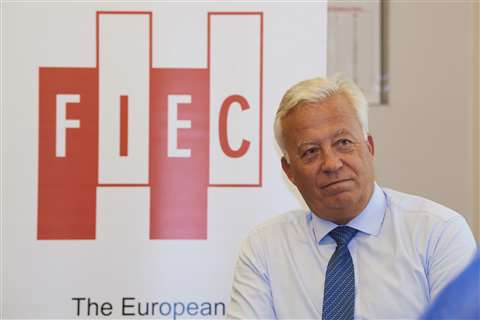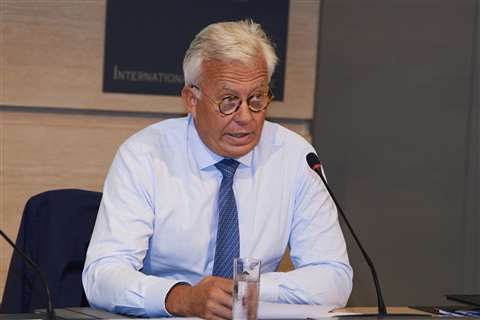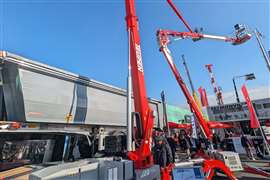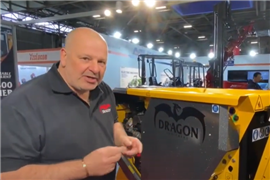Construction 4.0 will be key
07 August 2018

Kjetil Tonning’s two-year term as president of FIEC (the European Construction Industry Federation) comes at an interesting time for the industry in Europe, with the next election for members of the European Parliament due next year, and huge changes on the horizon.
He said those changes were probably going to happen faster than expected, because in his experience, it was hard to appreciate how fast the speed of development had been.
“If people had asked me ten years ago,” he added, “I could not have predicted what was going to happen.”
While much, if not all, of the FIEC focus is on the Brussels machinery, Tonning comes from outside the European Union. Having worked in the construction industry for more than 30 years, he has been at Veidekke, Norway’s largest contractor, for four and a half years. Before that, he spent 11 years with NCC.
There are a number of main goals in his sights, including the perceived unequal position regarding Chinese state-owned enterprises (SOEs) and EU public procurement. Then there is the new posting of workers Directive concerning the cross-border provision of services within the EU.
Probably at the top of Tonning’s list, though, is what is increasingly being called Construction 4.0 – the fourth industrial revolution. Effectively, this means the digitalisation of the industry, and everything that this entails.
Tonning said that a working group had been established within FIEC a couple of years ago, and that there had been a lot of interest from all the federations participating in the working group
“So it is obviously at the top of the agenda, not only for federations but for construction companies – both large companies and small companies – involving the entire value chain.”
He said construction had to ensure that it was part of the digitalisation process, rather than just the IT industry.
“If we are not involved, the IT industry would take charge and we need to avoid that.”
He said he didn’t see digitalisation as a threat internally within companies.
“But it is a threat that the stakeholders and the authorities consider the IT industry to own this topic and not the end user, which is the construction industry. We have to actually focus on the end user, and our needs.
“We have been accused of being an industry that is lagging behind, doing more or less what we were doing 20 years ago.”
Young people
Tonning felt that there was a shift within the industry, and there was a need to attract young people into it.
“It has been considered a dirty industry, or not very high tech, but the introduction and the way we include construction 4.0 into all branches is probably going to help us a lot in making us a more attractive industry for younger people.
“They are the ones who are actually able to use the new technology, I expect, to a higher extent than the older ones.”
He stressed that misconceptions lay at the heart of the “old fashioned” labels that have persisted.
“Construction is not low tech, it is not low productivity,” he said, adding that these perceptions needed to be changed.
“We already made a BIM (building information modelling) manifesto, together with more or less the entire construction industry – the suppliers, the products. This will probably make people outside the industry aware of the kind of role we are playing.”
The various industry associations, many of whom have a raft of shared goals, are increasingly working together to deal with the barriers which are lying in their way.

“We are much stronger if we join forces with others in the same value chain – and we need to be. So when we are saying something and we have a kind of consensus, we are much stronger representing a lot of the production in Europe, and this is a part of the new way of working,” he said.
“People realise that using BIM, using these tools, is involving the entire value chain. If you are not doing that, you are not benefiting 100% from what you can gain from the new technology.
“So we are depending on SMEs (small and medium-sized enterprises), we are depending on the suppliers – so everybody is dependent on each other to take full advantage of the new technology.”
Tonning said that in his experience, the industry needed SMEs.
“We are always depending on SMEs, and we are involving them – and they are rather quick in absorbing and using the new technology. Sometimes you think that the smaller companies are less developed – they more or less have the same skills.”
New technologies
He pointed out that there was not a big difference between white collar and blue collar workers nowadays when it came to using new technologies.
“Blue collars are as good as we are at using mobile phones and taking pictures. They understand that in the same way as we are doing it.
“In the early 1980s it was more or less only the white collars that understood what was going on, but that is not the situation anymore. It’s completely different.”
FIEC has also expressed its concern about Chinese state-owned enterprises (SOEs) and EU public procurement, and is looking for a level playing field in the matter.
Tonning said, “The access of Chinese state-owned enterprises to EU public procurement markets has become an active issue again.
“Considering that China excludes foreign contractors from domestically-financed tenders, and with respect to China’s overarching strategy, covering business, transport, science, education and society in the whole world, it is high time that the EU and the Member States developed strategies for defending the interests of their industries and citizens.”
Tonning gave what he described as “particularly striking examples”. He cited OBOR (One Belt One Road, also known as BRI, Belt & Road Initiative), and the meetings of China with Central and Eastern European Countries in the framework of China’s 16+1 initiative, in which bi-lateral relations are being fostered and financial dependencies created.
FIEC felt that contrary to China’s advertising of the BRI as a win-win situation for the whole world, it actually exported Chinese construction capacities overseas.
“In fact, OBOR/BRI can be considered as a kind of a Trojan horse”, said Tonning. He pointed out that for the European construction industry, the consequences were becoming increasingly visible, both in the EU Internal Market and on third country markets.
Croatian bridge
For example, the recent award of the EU-financed contract for the Pelješac bridge in Croatia to a consortium of Chinese SOEs was said to raise issues such as abnormally low tenders, distortion of competition by state aid, the use of EU funds and reciprocity.
The question of reciprocity was also said to be relevant in relation to third markets, as well as project financing, export credits and tied aid/loans.
“The EU Commission should investigate the project and the absence of a real check of this abnormally low tender by the Croatian authorities,” said Tonning.
For the European construction industry, FIEC and EIC (European International Contractors) are asking the European Commission and the co-legislators, the Parliament and Council, to take urgent action in order to create fair competition and a level playing field for European contractors, worldwide, as soon as possible.
FIEC said that with the adoption of the new modified Posting of Workers Directive, the EU legislator was intending to provide some answers to problems and fraud observed in the cross-border provision of services within the EU.
“Ensuring a level playing field for companies requires a legislative framework which provides an adequate balance between the freedom to provide services within the Internal Market and the protection of workers’ rights,” said Tonning. “This plays a crucial role in the competitiveness of genuine companies
“However, contrary to what some organisations are claiming, the recent modifications to the Posting Directive are not the panacea against all fraud. We therefore remain careful at this stage about the possible positive added value introduced by the new provisions.”
He added that much of the fraud seen in the area of posting was due, among other things, to factors such as fraudulent A1 forms, unpaid or incorrectly paid social security contributions, undeclared working time, etc, which would normally require other types of intervention.
FIEC at EU level, and its members at national level, will, it said, continue to co-operate in a constructive manner with the concerned authorities and stakeholders, in order to develop a comprehensive framework that can effectively guarantee fair mobility and the respect of workers’ rights within the Internal Market.






